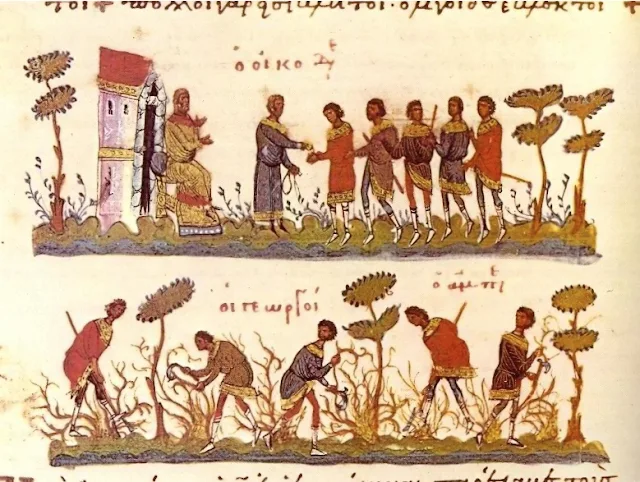 |
| Labourers in the vineyard |
The second verse of Psalm 127 takes to one of those key recurrent themes in St Benedict's Rule, namely the value of work.
The Rule famously makes an important place for manual work and work in service of the community. But while St Benedict generally prescribes work as a remedy against idleness and boredom, it is 'the Work of God', the liturgy that builds up the Church, that takes pride of place in the Rule.
And the reference in the Prologue of the Rule to God calling for workers in his vineyard is surely linked in large part to this, given the connection between the hours at which the Master calls for workers, and the hours of the Office, a connection pointed out by St John Cassian.
The recitation of this verse on weekdays, then, can be seen as a reminder of this key aspect of the Benedictine charism.
2
|
V
|
Labóres mánuum
tuárum quia manducábis: * beátus es, et bene tibi erit.
|
NV
|
Labores manuum tuarum manducabis, beatus es, et bene tibi erit.
|
|
JH
|
Laborem manuum tuarum cum comederis, beatus tu, et bene tibi erit.
|
|
τοὺς πόνους τῶν καρπῶν σου φάγεσαι μακάριος εἶ καὶ καλῶς σοι ἔσται |
Labóres
(works/labours) mánuum (of the hands) tuárum (your) quia (which/for) manducábis (you
will eat): * beátus (blessed) es (you are), et (and) bene (well) tibi (to you) erit
(it will be).
labor, oris,
m., work, labor,
toil, effort; also the results of one's labor, produce, possessions,
etc.
manus, us,
/., the hand
manduco, avi,
atum, are to eat.
bene, adv. well; rightly, uprightly.
DR
|
For you shall eat the
labours of your hands: blessed
are you, and it shall be well with you.
|
Brenton
|
Thou shalt eat the labours
of thy hands: blessed art thou, and it shall be well with thee.
|
MD
|
Thou shalt enjoy what thy
hands earned: blessed art thou, it shall be well with thee!
|
RSV
|
You shall eat the fruit of
the labor of your hands; you shall be happy,
and it shall be well with
you.
|
Cover
|
For thou shalt eat the labours of thine hands; O
well is thee, and happy shalt thou be.
|
Knox
|
Thyself shall eat what thy
hands have toiled to win; blessed thou art; all good shall be thine.
|
Grail
|
By the labor of your hands
you shall eat. You will be happy and prosper;
|
Living from our own work
At the literal level, the second verse of Psalm 127, which speaks of us being blessed by being able to live on the results of our own work, which can apply to all, but has a particular connotation for monastics, for St Benedict speaks early in the Rule of God calling us to be labourers in his vineyard, and later reminds his monks that:
And if the circumstances of the place or their poverty should require that they themselves do the work of gathering the harvest, let them not be discontented; for then are they truly monastics when they live by the labor of their hands, as did our Fathers and the Apostles.St Robert Bellarmine teaches us that it is appropriate for us to seek what is adequate and necessary, but we should reject riches:
Here we should reflect that the Prophet does not make happiness to consist in great riches, but in such as have been acquired by the labor of one's hands, and they are, generally speaking, moderate. Great riches either come by inheritance, or from plunder or usury, or some other bad source. St. Jerome quotes an old saying, and a true one, "The rich man is either a rogue or the heir of a rogue;"...Holy David then addresses not only the Jews, but all Christians, when he makes happiness to consist not in great riches, but in a sufficiency; the having wherewithal to live by one's just labor; and he censures two extremes — one, that of those who live on the others entirely; and the other, that of those who will not touch the labor of their hands, but, in a spirit of avarice, put it aside to increase their riches.But what about when we can't earn a living?
We have to be careful about reading this verse too literally, however: God does not guarantee us properity in this life, as St Robert Bellarmine reminds us:
It may happen, however, that some "who fear God," and "walk in his ways," may not be able to eat of the "labors of their hands," and have to endure hunger and thirst, by reason of their having been despoiled, or defrauded of their labor; but that will not bar the promise made in this passage; for if God sometimes lets his friends down so low that they would be glad to satisfy the cravings of their hunger with the fragments that fall from the table of the rich, as was the case with Lazarus, he will certainly give them something better, far better, instead; and that is joy from tribulation...This is peculiarly applicable to the pilgrims, who "rejoice in the tribulation" of want and difficulties; "for they know tribulation worketh patience, and patience trial, and trial hope, and hope confoundeth not, because the charity of God is poured out into our hearts."
The eternal fruits of our labour
Indeed, our true work in this world is not about earning the necessities of life, but rather the work of of building up the Church. Cassiodorus for example says:
But by labours he wished to denote good works carried out in this world to yield a sweet banquet as the reward to come; for eating means being refreshed by some food, and rejoicing in its abundance. So these labours which consist of good works are apprehended at the resurrection when these words are heard: Come ye, blessed of my Father, possess you the kingdom prepared for you from the foundation of the world. A blessed banquet this, which is not digested by the stomach, but is maintained in eternity unconsumed.
Psalm 127
Vulgate
|
Douay-Rheims
|
Canticum graduum.
| |
1 Beáti omnes, qui timent Dóminum,* qui ámbulant in viis ejus.
|
Blessed are all they that fear the Lord: that walk in his ways.
|
2 Labóres mánuum tuárum quia manducábis: * beátus es, et bene tibi erit.
|
2 For you shall eat the labours of your hands: blessed are you, and it shall be well with you.
|
3 Uxor tua sicut vitis abúndans: * in latéribus domus tuæ.
|
3 Your wife as a fruitful vine, on the sides of your house.
|
4 Fílii tui sicut novéllæ olivárum: * in circúitu mensæ tuæ.
|
Your children as olive plants, round about your table.
|
5 Ecce sic benedicétur homo, * qui timet Dóminum.
|
4 Behold, thus shall the man be blessed that fears the Lord.
|
6 Benedícat tibi Dóminus ex Sion: * et vídeas bona Jerúsalem ómnibus diébus vitæ tuæ.
|
5 May the Lord bless you out of Sion: and may you see the good things of
|
7 Et vídeas fílios filiórum tuórum: * pacem super Israël.
|
6 And may you see your children's children, peace upon
|
Gloria Patri et Filio et Spiritui Sancto.
|
Glory be to the Father, and to the Son, and to the Holy Ghost
|
Sicut erat in principio, et nunc, et semper, et in saecula saeculorum. Amen.
|
As it was in the beginning, is now, and ever shall be, world without end. Amen.
|
And for the next part in this series, continue on here.

